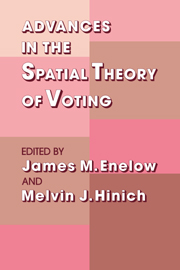Book contents
- Frontmatter
- Contents
- Foreword
- ADVANCES IN THE SPATIAL THEORY OF VOTING
- 1 Introduction
- 2 Multiparty Competition, Entry, and Entry Deterrence in Spatial Models of Elections
- 3 Heresthetic and Rhetoric in the Spatial Model
- 4 Spatial Strategies When Candidates Have Policy Preferences
- 5 A Decade of Experimental Research on Spatial Models of Elections and Committees
- 6 Candidate Uncertainty and Electoral Equilibria
- 7 The Theory of Predictive Mappings
- 8 Multicandidate Spatial Competition
- 9 The Setter Model
- Author Index
- Subject Index
Foreword
Published online by Cambridge University Press: 05 March 2012
- Frontmatter
- Contents
- Foreword
- ADVANCES IN THE SPATIAL THEORY OF VOTING
- 1 Introduction
- 2 Multiparty Competition, Entry, and Entry Deterrence in Spatial Models of Elections
- 3 Heresthetic and Rhetoric in the Spatial Model
- 4 Spatial Strategies When Candidates Have Policy Preferences
- 5 A Decade of Experimental Research on Spatial Models of Elections and Committees
- 6 Candidate Uncertainty and Electoral Equilibria
- 7 The Theory of Predictive Mappings
- 8 Multicandidate Spatial Competition
- 9 The Setter Model
- Author Index
- Subject Index
Summary
In an early paper (1929), Harold Hotelling studied the equilibrium of spatial economic competition between two firms that first chose locations and then price. His conclusion was that the firms would locate right next to each other, since each could gain by moving in the direction of the other and thereby increasing market share. It was assumed that consumers were uniformly distributed over an interval and paid the cost of transportation, so that each one would buy from the least-cost source, taking account of both price and transportation. Under these assumptions, the common equilibrium location would, he asserted, be found at the center of the interval, which is, in this case, the location of the median consumer.
Hotelling was especially concerned about this outcome because, as can easily be seen, the optimal locations of the two firms would be at the two quartile points, that is, at one-quarter of the interval length from each end. Hence, the competitive system led to a suboptimal outcome.
At the end of his paper, Hotelling argued that the tendency of competitors to become identical is applicable more generally. Spatial differentiation can be a metaphor for quality differentiation of products and for differences of political programs. Hence, Hotelling concluded, political parties tend to offer programs that resemble each other closely, instead of offering clearly separated alternatives, the latter, he thought, leading to superior outcomes.
- Type
- Chapter
- Information
- Advances in the Spatial Theory of Voting , pp. ix - xivPublisher: Cambridge University PressPrint publication year: 1990

